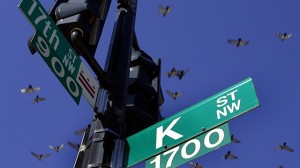
K Street has long been invoked as shorthand for moneyed lobbyists who ply influence in the city. (AP Photo/Charles Dharapak, File)
(Editor’s note: Thursday evening, the House passed the budget bill by a vote of 219-206. It was passed by the Senate on Saturday evening, 56-40.)
Last Sunday, Rebecca Shabad reported for The Hill that good government groups were “bracing for surprises in the massive government-funding bill” that must be passed this week in order to avoid a government shutdown. K Street lobbyists were drooling over the $1 trillion dollar budget authorization, and saw it as “a final chance… to find a vehicle for their priorities.”
Now we know what some of those “surprises” are.
The provision that’s drawn the most criticism is a measure that would weaken the already watered-down Dodd-Frank financial reforms passed in the wake of the 2008 financial meltdown.
It’s a proposal that, according to The New York Times, was essentially written by lobbyists for Citigroup and targets a central provision of Dodd-Frank that limits taxpayers’ exposure by requiring banks to isolate some of their riskiest bets in business units that aren’t insured by the federal government. The idea was to try to prevent Wall Street from making the kind of reckless trades that fueled the last crisis.
A lot of Republicans favor repealing the rule outright, so the provision is seen by many as a compromise — instead of killing the regulation completely, it would significantly expand the kinds of derivatives that are exempt from the rule. This is an example of big financial firms trying to socialize their risk.
But at The Wall Street Journal, David Reilly argues that “because banks have chosen to try and slide this through the legislative back door,” the amendment would “reinforce the notion among the public that Wall Street can’t be trusted and will always try to rig the game in its own favor.” As such, “the long-term cost of perpetuating that perception may well outweigh any short-term gains banks reap from this legislative maneuver.”
Another proposal would undermine what’s left of limits on campaign donations. According to Politico, it would increase the maximum amount a single wealthy donor could give to the Republican or Democratic parties and their congressional campaign committees from $97,200 to as much as $777,600.
Greg Sargent reports for The Washington Post that “in a little detail that doesn’t reflect particularly well on Congress, no one knows how this measure got into the bill.”
But, really, there’s no mystery here: The party committees — Democratic ones included — will tacitly support this measure, without saying so out loud, because it will, you know, allow them to raise a lot more money.
Pension fund trustees — both from unions and employers — pushed another provision into the bill that would allow some funds to make steep cuts to the benefits of current retirees, reversing 40 years of federal law. The rider could threaten the retirement security of up to 1.5 million middle-class workers, Michael Hiltzik writes in the Los Angeles Times.
Another rider reportedly was slipped into the bill by Sen. Susan Collins (R-Maine) “at the behest of trucking industry groups.” It would endanger public safety by easing restrictions on how many hours truckers can spend behind the wheel — even though driver fatigue is believed to be a leading cause of crashes. [UPDATE: After publication, Sen. Collins’ office reached out to BillMoyers.com to object to The Hill newspaper’s characterization that the trucking measure “was slipped into the bill,” which we quoted above. A spokesman says, “The provision was debated in the Senate Appropriations Committee in June 2014, and by a bipartisan vote of 21-9, it was approved and included in the Senate Transportation Appropriations bill.” However, the Senate Transportation Appropriations bill was defeated in the House in July. The Senate later passed a House version of the bill, which did not contain the provision. It subsequently reappeared, pushed by Senator Collins, as a rider in the spending bill, a move that Dorothy Samuels, writing in The New York Times on Tuesday, described as “egregious” and “an atrocious giveaway.”]
Negotiators have reportedly battled back and forth over an array of riders that would undermine the regulatory powers of the Environmental Protection Agency. The final draft contains a measure that would exempt big agricultural operations from clean water rules. The agency’s overall budget was also cut by $60 million compared to last year’s budget. According to The Washington Post, the EPA’s “budget has been slashed by $2.2 billion, or 21 percent, since fiscal 2010,” and “the cuts mean that EPA will have to reduce its staffing to the lowest levels since 1989.”
There are other cuts — to the IRS and the Affordable Care Act — and various partisan games like defunding Michelle Obama’s healthy school lunch initiative and freezing the salaries of Vice President Joe Biden and “senior political appointees.” It defunds ACORN, the low-income community organization that hasn’t existed since 2010. A notably cruel amendment would block the use of tax dollars to cover abortions for women housed in federal prisons.
This is a fluid story — it’s unknown what will remain in the final bill, or if a bill can be finalized. If the bill can’t pass, Republicans say they’ll offer a short-term funding bill that kicks the battle down the road until February, at which point, with a majority in both the House and Senate, they’ll have a stronger position.
One thing that’s clear is that this fight will shape how Congress functions over the next two years. One senior Republican staffer told The Hill, “If liberal Democrats vote for this package it shows that conservatives can use must-pass legislation to repeal the regulatory state.” He urged GOP leaders, the congressional newspaper reported, to “use the tactic to begin chipping away at other Democratic laws, including ObamaCare.”

This work is licensed under a Creative Commons Attribution-NoDerivatives 4.0 International License.



